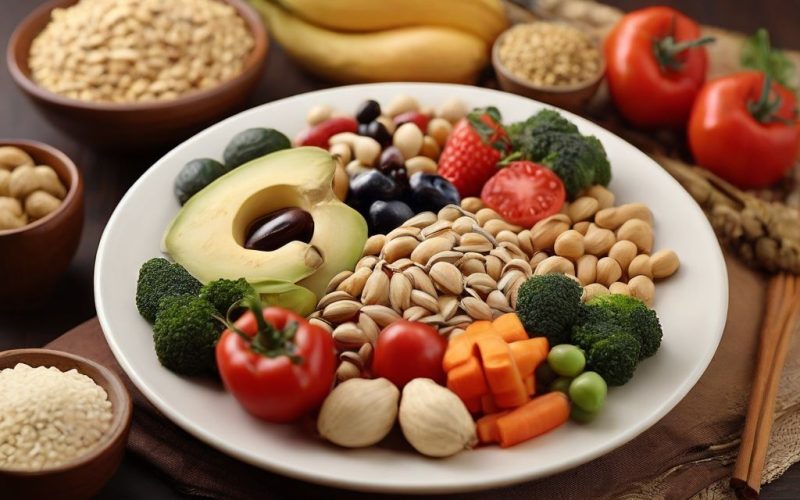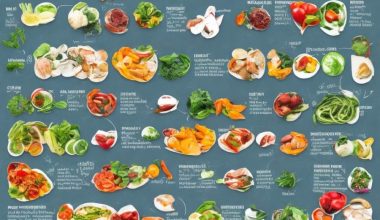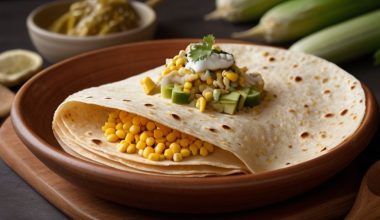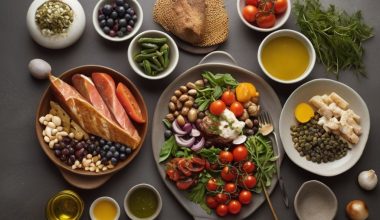The three main components of a Mediterranean diet are whole grains, fruits and vegetables, and healthy fats. The diet emphasizes the consumption of plant-based foods and lean proteins.
Diving into the heart-healthy Mediterranean diet reveals a bounty of fresh and flavorful foods that not only tantalize taste buds but also contribute to overall wellness. Central to this diet are whole grains like wheat, barley, and rice, which serve as staple energy sources.
Fruits and vegetables, rich in vitamins, fiber, and antioxidants, form the colorful foundation of daily meals. Healthy fats, primarily from olive oil, nuts, and fishes like salmon and sardines, provide essential fatty acids that support cardiovascular health. This trifecta underscores a dietary pattern that numerous studies associate with longevity and a reduced risk of chronic diseases.
The Mediterranean diet stands out for its balanced approach to eating, focusing on nourishment, variety, and enjoyment, making it a highly recommended lifestyle choice by nutritionists worldwide.
Introduction To The Mediterranean Diet
Embark on a flavorful journey with the Mediterranean Diet! This eating pattern goes beyond just food. It’s a part of a cultural heritage rooted in sunny seaside countries. The diet is famous for delicious meals and many health perks.
Origins And Popularity
The Mediterranean Diet has its roots in countries like Greece, Italy, and Spain. Lush with olive trees and bordered by the sea, these regions offer fresh produce, tasty seafood, and heart-healthy oils.
The diet gained fame in the 1960s. Scientists noted fewer heart issues in Mediterranean people. Today, it’s loved worldwide for its balanced approach to dining.
Health Benefits
- Boosts heart health
- Supports weight management
- Improves brain function
- Reduces the risk of chronic diseases
Abundant in vegetables, fruits, nuts, and grains, this diet is a powerful asset for a strong body and mind. Studies show it may even extend one’s lifespan.
Core Principles Of The Mediterranean Eating Pattern
The Mediterranean Diet stands out with its time-tested eating habits. Focusing on fresh ingredients and balance, this diet emphasizes overall wellness and longevity. Let’s dive into the core principles that make the Mediterranean eating pattern a globally embraced lifestyle.
Emphasis On Plant-based Foods
Vegetables, fruits, nuts, and grains form the foundation of the Mediterranean Diet. These foods are not just side dishes but centerpieces of every meal. A colorful variety graces the table, ensuring vital nutrients and antioxidants are in abundance.
- Vegetables: Served in generous portions at each meal.
- Fruits: Enjoyed as natural desserts or snacks.
- Whole grains: Consumed regularly as breads, pasta, and cereals.
- Nuts and seeds: Provide healthy fats and are perfect for on-the-go snacking.
Moderation In Consumption
The Mediterranean lifestyle doesn’t just focus on what to eat but also how much. Smaller portions, eaten slowly, allow for savoring each bite and prevent overeating. Poultry, eggs, cheese, and yogurt are consumed in moderate amounts, while red meat is limited.
| Food Type | Frequency |
|---|---|
| Red Meat | Few times a month |
| Fish and Seafood | At least twice a week |
| Poultry/Eggs | Weekly |
| Cheese/Yogurt | Daily, in moderation |
Primary Component: Fruits, Vegetables, And Whole Grains
The heart of the Mediterranean diet thrives on nature’s bounty. Rich in colors, tastes, and nutrients, fruits, vegetables, and whole grains form the foundation of this celebrated diet. Emphasize boldness with each meal by incorporating these vital food groups.
Variety And Nutritional Value
The Mediterranean diet excels in variety and nutritional wealth. Imagine every color in the rainbow on your plate. The diet brings a range of fresh fruits, leafy greens, and fiber-packed whole grains. Each serving is a powerhouse of antioxidants, vitamins, and minerals. Together, they combat diseases and promote gut health.
- Antioxidants in berries and citrus fruits shield your cells.
- Leafy greens like spinach offer iron and calcium.
- Whole grains ensure a steady release of energy.
Daily Servings And Preparation
Balance and moderation define your daily servings in the Mediterranean eating pattern. Aim for at least five servings of vegetables and fruits and complement them with whole grains. It’s not just about what you eat; it’s also about how you prepare your food. Favor steaming or grilling over frying. Choose olive oil as a healthy fat. Look for whole-grain varieties when picking bread, pasta, or cereals.
| Food Group | Daily Servings | Preparation Tips |
|---|---|---|
| Fruits | Minimum 3 servings | Enjoy fresh or as natural fruit juices |
| Vegetables | Minimum 2 servings | Steam to retain nutrients |
| Whole Grains | 1-2 servings | Opt for whole-grain bread or pasta |
Embrace the abundance of the Mediterranean diet with its rich array offruits, vegetables, and whole grains. By doing so, every meal becomes a vivid canvas, not just pleasing to the eye but nurturing for the body as well.
Secondary Component: Healthy Fats
The Mediterranean diet shines in its ability to include healthy fats without the guilt. Unlike diets that shun fat, it embraces it – but only the beneficial kinds. The secret lies in choosing fats that support a healthy heart and lifestyle.
Olive Oil As A Staple
Olive oil is the cornerstone of the Mediterranean diet’s fat component. Praised for its monounsaturated fats, olive oil not only adds flavor but also offers numerous health benefits. Use it for cooking, as a dressing, or simply as a dip for your favorite bread.
- Enhances flavor
- Supports heart health
- Rich in antioxidants
Balancing Saturated And Unsaturated Fats
Understanding the balance between saturated and unsaturated fats is key to a heart-healthy diet. The Mediterranean diet favors unsaturated fats, found in nuts, seeds, fish, and olive oil, while limiting saturated fats often found in processed foods and red meat.
| Type of Fat | Sources | Benefits |
|---|---|---|
| Unsaturated Fats | Olive oil, nuts, seeds, avocados | Reduces heart disease risk |
| Saturated Fats | Red meat, dairy, coconut oil | Limited for heart health |
Tertiary Component: Protein Sources
When exploring the vibrant Mediterranean diet, protein plays a star role. It’s not all about meat though. The diet’s approach to protein is unique and heart-healthy. It includes a variety of sources rich in nutrients and flavor. Let’s dive into the types of protein that make this diet so beneficial.
Seafood And Fish
Fish and seafood are primary protein sources in the Mediterranean diet. People eat them at least twice a week. This not only provides essential proteins but also gives you healthy omega-3 fatty acids. Here are popular options:
- Salmon: High in omega-3s, perfect for grilling.
- Tuna: A versatile fish for salads or steaks.
- Mackerel: Full of flavor for hearty dishes.
Importance Of Legumes And Nuts
Legumes and nuts are also crucial. They are packed with proteins and fibers. Eating them reduces heart problems and keeps you full longer. Chickpeas, lentils, and almonds are staples. Here’s why they’re important:
| Food | Benefits |
|---|---|
| Chickpeas | Rich in protein, versatile in dishes. |
| Lentils | Great for heart health, easy to cook. |
| Almonds | Healthy snack, good for brain health. |
Include these delicious and nutritious protein sources to truly embrace the Mediterranean way of eating. They are good for your body and taste great!
Incorporating The Diet Into Everyday Life
Embracing the vibrant and wholesome approach of the Mediterranean diet can transform how you eat and live. Rich in fruits, vegetables, lean protein, and healthy fats, this eating style isn’t just about food; it’s a lifestyle. But the question stands: how do you weave these nutritional threads into the tapestry of everyday life? The key lies in simple, smart, and sustainable choices.
Simple Meal Planning Tips
Planning your meals can be both fun and easy. Here are straightforward strategies to help you incorporate a Mediterranean twist into your daily meals:
- Stock up on Mediterranean staples like olives, tomatoes, cucumbers, and whole grains.
- Prep your veggies ahead of time to make tossing them into a meal quick and effortless.
- Opt for a variety of colorful fruits as snacks or desserts instead of sugary treats.
- Choose lean proteins like fish or chicken to be the centerpiece of your meals several times a week.
- Integrate healthy fats, such as olive oil and nuts, into your diet daily.
| Day of the Week | Meal Idea |
|---|---|
| Monday | Grilled salmon with quinoa and steamed broccoli |
| Wednesday | Lentil salad with assorted veggies and feta cheese |
| Friday | Whole-grain pasta with a tomato-based sauce and a side salad |
Making Sustainable Choices
Adopting the Mediterranean diet also means choosing foods that support a healthy planet. Here’s how you can make sustainable choices:
- Buy local and seasonal produce to reduce your carbon footprint and support community farmers.
- Reduce meat consumption by celebrating “Meatless Mondays” or opting for smaller portions.
- Minimize waste by repurposing leftovers into new meals or cooking in appropriate portion sizes.
- Select seafood from sustainable sources to help protect ocean ecosystems.
- Grow your own herbs and vegetables, even if it’s just a small herb garden on your windowsill.
For instance, swapping out beef for chickpeas in your homemade burger not only lowers your intake of red meat but also increases your fiber intake, reinforcing both your health and environmental safeguarding efforts.
Success Stories And Cultural Insights
Success Stories and Cultural Insights shine a light on the impressive benefits of the Mediterranean diet. This eating plan has gained fame not just for weight management but also for overall health enhancements. From heart health to longevity, anecdotes and research alike suggest this diet’s positive impact.
Individual Health Improvements
Remarkable health transformations underscore the Mediterranean diet’s effectiveness. People across the globe credit this diet with enhancing their quality of life. They share stories of lowered cholesterol, improved blood pressure, and better blood sugar levels. Everyone talks about the glow in their skin and energy in their steps.
- Reduced risk of heart diseases
- Better weight management and fat loss
- Increased longevity and vitality
Culinary Traditions And Social Aspects
The diet’s roots lie within rich cultural traditions. Meals are more than food; they’re social events shared with family and friends. Each dish tells a story, tying in with centuries-old practices. Fresh, local ingredients are the stars in these socially vibrant meal-making rituals.
| Component | Role in Diet |
|---|---|
| Olive Oil | Main fat source, rich in antioxidants |
| Fruits & Vegetables | Central to every meal, supplying vitamins |
| Whole Grains | Integral for energy, loaded with fiber |
The blend of fresh produce and communal eating patterns plays a crucial part in the diet’s success. These practices encourage mindful eating and portions suitable for maintaining a healthy lifestyle. The Mediterranean diet not only feeds the body but also nourishes the soul.
Frequently Asked Questions For What Are The Three Main Components Of A Mediterranean Diet?
What Are 3 Examples Of A Mediterranean Diet?
Three examples of a Mediterranean diet include whole grain pasta with vegetables, grilled fish with olive oil dressing, and quinoa salad with feta and tomatoes.
What Is The Key Component To Mediterranean Diet?
The Mediterranean diet emphasizes fruits, vegetables, whole grains, and healthy fats from sources like olive oil and nuts. Lean proteins, particularly fish, complement this plant-heavy diet.
What Is The True Mediterranean Diet Food List?
The true Mediterranean diet includes vegetables, fruits, whole grains, legumes, nuts, seeds, olive oil, herbs, fish, and moderate wine consumption. Lean meats and dairy are eaten less frequently.
What Are The Main Nutrients In The Mediterranean Diet?
The Mediterranean diet’s main nutrients include healthy fats, lean proteins, whole grains, fruits, vegetables, and legumes. Omega-3 fatty acids from fish and olive oil are essentials too.
Conclusion
Embracing the Mediterranean diet means focusing on plant-based foods, healthy fats, and lean proteins. It’s a lifestyle shift that invites both flavor and nutrition to your table. To embark on this culinary journey, remember: fresh vegetables, olive oil, and fish are your anchors. Adopt these pillars and savor the taste of well-being.







